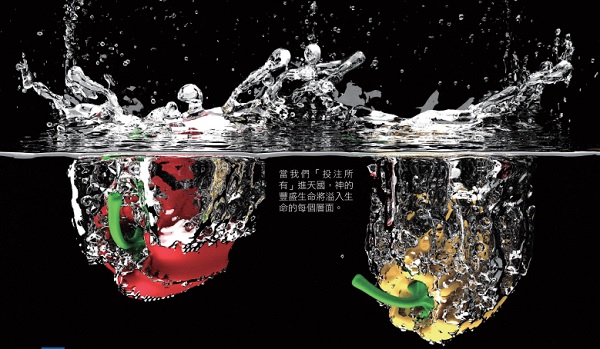To succeed, you must "bet everything" to enter the kingdom of heaven
Translated by Lin Yu

"Bet everything" to enter the kingdom of heaven
The two articles in this series (see issues 60 and 64 of this magazine) talk about how to bring the kingdom of heaven into your business and tasks: you must give everything as the price of entering the kingdom of heaven; you must use the perspective of a steward, not your own. Think about life and the business you run. This is the “paradigm shift” of the Kingdom of Heaven.
In today's society, the term "bet everything" has been widely used. It was originally a term used in poker, meaning to make a desperate move. Today, in corporate America, the military, and even the government, the term is used to describe a person who devotes all his resources to a specific goal, without any reservations and with complete commitment. Win or lose, live or die, it all depends on the outcome of their determined efforts; they "bet everything."
In order to become a disciple of the Lord Jesus Christ and to abide in Him and He in us, one must "put everything in". In order to enter the Kingdom of Heaven and see it manifest in your life, you must "put everything in." If people are not willing to sell everything in order to enter the Kingdom of Heaven, people can only watch from a distance and cannot enter and live in the Kingdom of Heaven.
What exactly is the Kingdom of Heaven? What does the Kingdom of Heaven have to do with the business you run?
To define the Kingdom of Heaven, we must first define the Gospel of the Lord Jesus Christ. The gift of salvation is available only through Christ Jesus, which is the gospel of salvation. Sin separates us from the God who created and loves us; God demonstrated His perfect love by giving His Son, Jesus, to shed His blood for our sins. We are redeemed from the kingdom of darkness and enter the kingdom of heaven. This is the so-called Romans Road to Salvation (see Romans 3:23, 6:23, 5:8, 10:9; John 3:16; Revelation 3:10).
The body of Christ, especially those who sit in the pews on Sunday, does a pretty good job of preaching the gospel of salvation. The gospel of redemption seems to mean that God is only interested in redeeming souls. However, what Jesus promises is abundant life in body, mind, spirit, family, relationships, etc.
The Bible calls the gospel "the gospel of the Kingdom." The gospel of redemption is part of the gospel of the kingdom; most of the time what the Lord Jesus preached to those who wanted to become His disciples was the gospel of the kingdom.
He describes the kingdom of heaven, contrasting the kingdom of this world with life under the Mosaic Law. His message lets those who follow know how to enter the heavenly kingdom, the paradigm shift that must be done in order to enter this kingdom, and expects the disciples to live out the new standards set for a righteous life.
What exactly is the Kingdom of Heaven? This is where the sovereignty of the King of Heaven lies; it is the King of Heaven who has absolute authority and power and rules over all places. His laws and regulations are enforced here; disobedience to the king will be punished and destroyed. This is an eternal kingdom, a spiritual kingdom; it is sovereign over all other kingdoms, including this world. The kingdom of heaven is at hand and is being built little by little until the kingdom of this world becomes the kingdom of the Lord Christ; He will reign forever and ever.
Before we are born again, we all see things from a worldly perspective. Heaven is very different. The reason Jesus spent so much time describing the Kingdom of Heaven was because He wanted his followers to prepare for the paradigm shift.
“Bet everything” but not in the Lord
Jeno and Juni are leaders in the church and are fully committed to Christ. Before Jeno knew the Lord, he was in debt and alcoholic. Although he was an agnostic, he called on a God he did not believe in, and the Lord came into Jeno's life. A few months later, my wife Junni also believed in the Lord.
Over the next few years, Jeno and Juni joined the church and devoted themselves to serving the Lord. They participated in Sunday school, Bible study classes, children’s ministry, evangelism, and also started tithing, donating, and helping the poor. Geno hung a large wooden cross around his neck and took every opportunity to let people know that they needed to be born again to avoid going to hell. He may not understand the kingdom of heaven yet, but he must know the gospel of redemption.
Geno had the gift of teaching and was eager to further his studies, so he sold everything he had and went to a Bible college with his family. Juni homeschooled her children, and Jeno enrolled in Bible classes and found a part-time job to help pay the bills. After graduation, they returned to their hometown. Geno found a good job in a technology company, while Junni stayed at home to take care of the children. In order to pay off their debts as quickly as possible, they save money. Such hard work and discipline paid off, and all debts were paid off three years later. They use the same degree of discipline to allow the church to lead people to the Lord and teach the Bible with a small budget.
Because of loyalty, diligence, and the Lord’s blessing, Jeno and Junni’s church grew to over 300 people. Their strength was hard work and discipline, not relationships, and the Lord sent several strong leaders to help build the church and act as a buffer between the members and the no-nonsense Geno. He understands how to be a good steward, but he has not yet learned how to love with God’s unconditional love. When several leaders left, the members had to face Jeno and Juni directly, and their strictness caused many people to leave. At last I heard that there were less than 40 members left in the church.
Regarding the Kingdom of Heaven, Jeno and Junni absolutely "invested everything", but they did not know how to abide in the Lord and let the Lord abide in them. When people talk to them, they don’t see Jesus, they see the old me who is not yet dead. Jeno and Juni did not have divine love in their hearts and became the Pharisees in the New Testament. They set high standards that they themselves cannot live up to, but demand that others meet them. Their love for others was conditional, based on compliance with requirements and obedience to commandments.
There are many religious people in the body of Christ. We do need to "invest everything" in the kingdom of heaven and the Lord Jesus. However, unless we first learn how to abide in Him and let Him abide in us, others will not be able to see Jesus from us, but will only see the Pharisees in the New Testament. people.
"Bet everything", including the entire "family business"
Many people think that once they are born again and saved, they start going to church, giving tithes, and being a model Christian, waiting for the Lord to return or be called home to heaven. Can such a life be viable? It’s no wonder that we don’t see smiles on our faces in church on Sundays. It’s no wonder that we have trouble attracting the rest of the world to join us.
In the paradigm of the Kingdom of Heaven, once we are born again, we do not enter the Kingdom of Heaven empty-handed; we must bring everything with us. The Lord Jesus wants to gain you, and the price of entering the kingdom of heaven is everything you have. Let us first take a closer look at the Greek word oikos, which is often translated as house or family.
“Believe on the Lord Jesus, and you and your household will be saved” (Refer to Acts 16:31)The "family" in "oikos" is the word oikos, which refers to a house, a whole family, a family, a family, and even a country. In modern terms, it is "estate". In ancient Greece, a person's wife, children, slaves, farmland, livestock, etc. could all be counted as his oikos. The “family” mentioned in Acts 16:31 is “family property.” If the jailer only needed to be reborn based on his own decisions, there would be no need to mention his "family" or "family property."
The Lord Jesus expects us to enter the kingdom of heaven with everything we have, including who we are and what we have. Mountains of debt and failing businesses? Bring it with you. Have you ever been heartbroken because someone offended or hurt you? Bring it with you. Have a destructive addiction? Bring it with you. Do you see yourself as defective? Bring it with you. The Lord Jesus is in the business of healing and restoration. He wants to make your whole being perfect, not just your soul. Not only does He invite you to bring oikos with you, He insists on it. The price of entering the kingdom of heaven is your entire "family property", that is, everything you have and everything you have; you must "invest" everything in order to "enter".
What will the Lord Jesus do with your property? He will restore everything: bind up broken hearts, proclaim release to the captives, comfort those who mourn, and replace ashes with beauty. He will amaze the wise at your weakness and foolishness; He will remove the mountains and fill the valleys in your life; He will free you from the chains of addiction, anger, and bitterness. He is the King, and your responsibility is simply to bring everything you are and have into the Kingdom of Heaven and leave it to Him to handle it all.

▲The Lord Jesus invites you to enter the kingdom of heaven with your entire “family possessions”, that is, everything you are and everything you have.
"Bet everything" to have an abundant life
As business owners, Gauss and Weiya also bring an attitude of commitment into the office, believing that the Lord brings all employees, customers, manufacturers, and business partners into their lives. They view workplace relationships as ministry, as if they are primarily serving these people. After meeting a new person, they will ask Jesus: Did the Lord bring him? What's the purpose? How to work with him? If they are not sure that this person is brought by the Lord Jesus, they will also ask the Lord to take away the person who does not belong here.
They prayed for themselves and the company; they tried their best to walk with the Lord in every detail of their lives. Whether at home or in the company, they never abandon Jesus; they always strive to be one with the Lord.
Even though they "invested everything", they still encountered challenges and struggles; but they did not fight alone. They knew that the Lord was always with them and believed that He would lead them. Abundant life overflows into marriages, relationships, businesses, etc., and their heavenly missions. When one "invests everything" and remains in the Lord, His zōē(abundant life in and from God) enters every aspect of life. His life produces more life. This is the life we seek.
Gauss and Via are good examples of "bet all". On a personal level, they live in the presence of God and routinely seek His guidance in everything they do. They saw that everything they owned belonged to the Lord, and they were always ready to give it out and share it with others; they were never afraid of lack, knowing that if the Lord asked for it, He would give more. Everything they have is given by the Lord; apart from being gained by the Lord, they have nothing.
Most Christians are unfamiliar with the Kingdom model and are taught only about statutes and regulations, observing the feasts and Sabbaths, giving tithes and offerings, and serving. The Kingdom of Heaven is not about religion, it is about passion and purpose; it is about restoring everything to the fall of Eden as if there had never been one; it is about living in the Lord, moment by moment, and He living in us. The Kingdom of Heaven is no longer about religion, but about an ongoing, uninterrupted relationship with the God who loves us and made us according to His will; it is about His life flowing through us into everything we touch. This concept was so radical that Jesus spent a great deal of time preaching about the paradigm shift of the kingdom.
Tim and Doja are also good examples of “putting it all in” by remaining in the Lord and stewarding all He has. They decided to retire from their struggling small construction company, turn the business over to a manager, take some time off, and move to another state to join a church with strong apostolic training. The couple immersed themselves in the Word and worship of the Lord, developing a close relationship with the Lord Jesus, learning to recognize His voice, and allowing the Holy Spirit to guide decisions in life and business.
After the Sabbath period, they returned to their hometown and business. Afterwards, feeling the call of the Lord Jesus, while keeping the original company in operation, the family moved to a new place and started a new company, and asked intercessors to pray for the family and business. Their lives begin to flourish.
Even though their business was stable and their finances were prosperous, Tim and Doya felt that the Lord Jesus led them to establish a non-profit ministry to bless the local indigenous people and heal interracial relationships. They invest a large portion of their profits and see themselves as stewards, not owners, of all resources. They realize that God has a bigger plan for them and the business they run—He wants to use the business and ministry to restore more people; He wants to bless more people through the business, ministry, and personal testimony.
The two began providing inner healing and marriage counseling to a growing number of employees. Tim and Doja knew that the Lord Jesus was more interested in building up people involved in business than in growing the business. As they work deeply into people's lives, God also works deeply into their businesses and ministries.
The Kingdom of Heaven lies in effectiveness, expansion, and multiplication; zōē’s life, which is abundant life, is based on the Kingdom of Heaven. Give your business to the Lord for the sake of His kingdom, and He can do wonderful miracles. The Lord Jesus used Peter’s boat to preach, and also used his boat to perform miracles of fishing; He multiplied five loaves and two fish, enough to feed 5,000 people, and also filled 12 baskets of fragments. (Refer to Luke 5:3-7; 9:12-17)
The Lord Jesus wants to use the oikos “household” we give Him, including our loaves and fishes, our boats, our businesses, assets, talents, gifts, and even experiences. The Lord Jesus never wastes anything, but He also will not use anything that is not given to Him. Are you committing your business and mission to Him? Has your business died in Christ and thus received resurrection life, a life consecrated to the Lord and used by the Lord? Perhaps this is the moment for you to baptize your company, belong to Jesus, and enter the Kingdom of Heaven.
The key to a heavenly model is passion and purpose for the Lord and His kingdom. In the next article, we will look at how to discover the purpose of life after entering the Kingdom of Heaven. I call it my “Kingdom Mission.”

▲After feeding the crowd, there were still 12 baskets of scraps left; the Lord Jesus will not waste everything we offer.
 Jeff Ahern), a former naval officer, has provided consulting services on management and business process improvement for Fortune 500 companies and government departments for more than 20 years; he is the author of "Kingdom Business Success" (Chinese temporary translation). Co-founder of Sozo Services, a spiritual consulting firm that assists corporate leaders in achieving personal and corporate goals using Bible-based, Holy Spirit-guided solutions.
Jeff Ahern), a former naval officer, has provided consulting services on management and business process improvement for Fortune 500 companies and government departments for more than 20 years; he is the author of "Kingdom Business Success" (Chinese temporary translation). Co-founder of Sozo Services, a spiritual consulting firm that assists corporate leaders in achieving personal and corporate goals using Bible-based, Holy Spirit-guided solutions.
